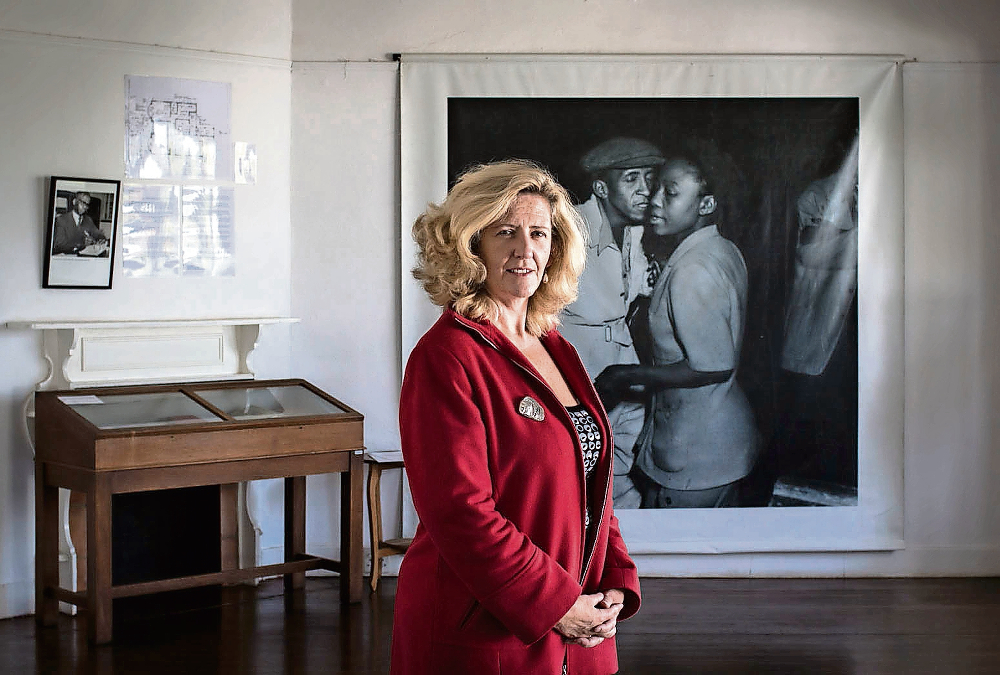The Church of Christ the Kind where Trevor Huddlestone ministered to the people of Sophiatown during the dark days of apartheid.
Anglican priest Trevor Huddleston lived in Sophiatown throughout the 1940s, serving a faith and education mission. He loved the people of Sophiatown and their generosity. From the Church of Christ the King and St Peter’s School, “father” and his team administered empowerment, inspiration and discipline to the youth.
Huddleston’s spirit and the work he did for unity and dignity was evident in this week’s opening of a new building run by the Trevor Huddleston Memorial Centre, situated in the heart of Sophiatown.
The Sophiatown Heritage and Cultural Centre, known as Sophiatown – The Mix, is the first new community space erected there since 1955. The building offers the historical communities a point of reconnection 60 years after Sophiatown residents were removed and scattered into racially segregated areas.
There has been a long build-up to this initiative. In 1998 the City of Johannesburg gazetted the renaming of Triomf back to its original name of Sophiatown, which was finalised in 2006. The city then purchased and renovated Dr Alfred Bitini Xuma’s original home.
Xuma was a medical practitioner and president of the ANC in the 1940s. This home was one of two to escape the demolitions of 1955 to 1963 that bulldozed the entire suburb off the edge of a cliff – and in the rubble erected blocks of flats, which with poetic irony retain the appearance of huge gravestones rising out of the bleak aftermath.
Today, the Xuma home is a national heritage site and a living room for music, poetry, art, photography, talks and tours. It is a lighthouse for a cultural expansion into a future Sophiatown cultural and heritage precinct.
A multipurpose “green” centre
The Trevor Huddleston Memorial Centre, founded in 1999 by Thabo Makgoba, now archbishop of Cape Town, was invited by the city to run the Xuma house. The centre acquired the adjoining stand and consulted widely before building a multipurpose “green” centre.
The project was largely funded by the National Lottery, private donations and contributions from the department of arts and culture. This architecturally attractive centre with high ceilings and good acoustics has taken on the name of Sophiatown – The Mix, and was launched on Heritage Day with a celebration of the possibilities of an integrated South Africa.

Tricia Sibbons in the original home of Dr Alfred Bitini Xuma. (Jacques Nelles, MG)
Tricia Sibbons, director of the Trevor Huddleston Memorial Centre, says: “It is a multipurpose space where people can connect with each other at a human level, where lots of different catalysing ideas can be piloted, tested or tasted. We hope it becomes a place where you can encounter other people and yourself in a different way.
“Everyone is equally able to give something and receive something. Heritage is not just about the past, but about what you leave in the future. Connecting to issues of sustainability and enjoying arts and culture allows people multiple identities.”
Sophiatown – The Mix can accommodate a variety of projects: pop-ups such as discussions and ceremonies, as well as regulars such as the Jazz Encounters sessions, dance events, entrepreneur workshops and interactive debates.
The golden age of Sophiatown
There is something for everybody during the year – some free, some paid for and some subsidised – creating a self-sustaining circle of community-led culture, connecting current generations with the past while supporting the future.
In the golden age of Sophiatown, from about 1940 to 1955, there was the boisterous sound of African jazz, a literary flowering through Drum magazine journalists and writers, and the creation of a unique language – a mishmash of English, isiZulu, isiXhosa, Sesotho, Sepedi, Xitsonga, Setswana, isiNdebele and Afrikaans, slanged with a twang. There was a resistance mind-set and a subversion of the racial laws. People saw no divisions, only human beings.
And today the cultural landscape is just as dynamic. Sophiatown is a connecting place for researchers, novelists, actors, playwrights, filmmakers and musicians, all expanding the cultural wisdom systems and know-ledge base. African jazz has taken on a spiritual movement of self-knowledge, healing and transformation. And a new style of self-assuredness is fast developing, 21 years after the first democratic elections.
Sophiatown has retained its potential for diversity, edginess and humanity. Located in one of the city’s “corridors of freedom”, it has people of every background living there today. Some inhabitants from pre-1955 have moved back, residents who moved into the renamed Triomf in the 1960s are welcoming the change and new people have arrived to bring fresh energy.
“Sophiatown was freedom. Sophiatown was this place where you could be yourself. And that is the spirit that has been passed on to a new generation,” said former Sophiatown preschool head and resident Sally Motlana.
Sibbons adds: “The most moving experience for me was when we would bring people back who had not been here for 50 years. People were knitted. That power of connection to people and place, and that mutual recognition of another person’s humanity, has survived the physical destruction and helps us build the future.”
Community radio station Kofifi 97.2FM is broadcasting from Sophiatown – The Mix (71 to 73 Toby Street, Sophiatown) throughout heritage weekend, when a number of events are taking place. On Friday September 25 at 8pm, catch a Jazz Encounters concert featuring the Lex Futshane Trio (tickets cost R110). On Saturday September 26, take a guided walking tour through Sophiatown (R40 for adults; R20 for under-16s). For bookings, call 083?550?7130 or email [email protected], or visit sophiatown.net for more details